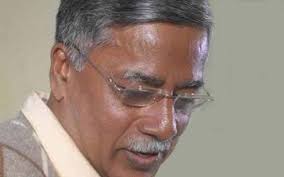Bhopal, Mar 18: Rebel Congress MLAs from Madhya Pradesh who are staying at a resort in Bengaluru, on Wednesday said they went there voluntarily.
Issuing video messages, the rebels said they didn't want to meet senior party leader Digvijay Singh who was briefly detained near the resort this morning.
Madhya Pradesh Chief Minister Kamal Nath and other leaders of the Congress have been claiming that the rebel MLAs were being held in captivity by BJP.
High drama unfolded this morning near the resort, as Singh, a two-time Madhya Pradesh Chief Minister, staged a protest accusing the police of not allowing him to meet the legislators, following which he was detained briefly and released later.
Singh, along with Karnataka Congress chief D K Shivakumar, is meeting police top brass seeking opportunity to meet the MLAs.
Singh hit out at Union Home Minister Amit Shah and Karnataka Chief Minister B S Yediyurappa, accusing them of trying to block their efforts to get in touch with the legislators.
"We have come here voluntarily on our own wish; we have got to know from some people that a few leaders from Madhya Pradesh including Digvijay Singh and some MLAs have come here. We don't want to talk to anybody," Congress rebel MLA from Sumawali Aidal Singh Kansana said in a video message.
"We have tried enough to speak with every one for the last one year, when they did not hear us for one year, what they will hear us in one day? We want to say only this that we have come here as per our wish and go back as per our wish," he added.
Another rebel MLA Govind Singh Rajput too said they have come voluntarily and don't want to meet anybody.
"We got to know that Digvijay Singh has come with a few Ministers and leaders. Unnecessarily at the gate they are saying they want to meet us. When no MLA wants to meet him, they should not be doing this. All MLAs have sent in their resignation," he said in a video message.
Currently, 22 rebel MLAs are said to be camping in the city.
These videos were shared by former Congress leader Pankaj Chaturvedi, a close confidante of BJP leader JyotiradiyaScindia.
In a video message, Bisahulal Singh (Anuppur) said Digvijay Singh had fooled them for 40 years.
"My seniority was neglected. We recognised Digvijaya Singh as our leader for 40 years but he only fooled us. We have come here voluntarily," he said.
"Rahul Gandhi had told us that my name, along with Aidal Singh Kansana (Congress MLA from Sumawali), had figured in the list of state Cabinet but they were struck off due to nepotism," he added.
Pohri MLA Suresh Dhakad said they received information on Digvijay Singh's visit on Wednesday through television channels.
"The present crisis was caused due to Digvijay only. We don't want to meet him," he said.
Karera MLA Jasmant Singh Jatav also blamed Digvijay Singh for the plight of Congress in Madhya Pradesh.
Dimni MLA Girraj Singh said they all have already resigned.
The MLAs who have issued video messages also included Manoj Choudhary (Hatpipalya), Kamlesh Jatav (Ambah), Raghuraj Kansana (Ambah), Brijendra Singh (Mungaoli), Raksha Santram Sironiya (Bhander), Munnalal Goyal (Gwalior East), Rajyavardhan Singh (Badnawar), OPS Bhadoriya (Mehgaon), Ranvir Singh Jatav (Gohad) and Hardeep Singh Dang (Suwasara).
Former ministers Tulsi Silawat (Sanver), Mahendra Singh Sisodia (Bamori), Imarati Devi (Dabra), Pradyumn Singh Tomar (Gwalior), Govind Singh (Surkhi) and Prabhuram Choudhary (Sanchi) also issued videos.
The resignations of these six former ministers were accepted by Assembly Speaker NP Prajapati while those of 16 others are on hold.
The rebel Congress MLAs held a press conference on Tuesday and claimed that 20 more party MLAs want to join them. The rebels also said that they were thinking of crossing over to the BJP in the days to come.
The Congress-ruled Madhya Pradesh has been in a political turmoil since the MLAs resigned on March 10 following the suit of Scindia, who joined the BJP on March 11.
 "I am Chairman of RSRTC and Additional Chief Secretary for over the last four years and competent for the post of Chief Secretary but the present CS is given 3 months extension by the state government. Hence I cannot work under a junior," Chairman of Rajasthan State Road Transport Corporation Umrao Salodiya said here.
"I am Chairman of RSRTC and Additional Chief Secretary for over the last four years and competent for the post of Chief Secretary but the present CS is given 3 months extension by the state government. Hence I cannot work under a junior," Chairman of Rajasthan State Road Transport Corporation Umrao Salodiya said here.




Comments
How sad , me too is thinking from long time
Welcome to the umbrella of Islamic brother hood sir.
Add new comment